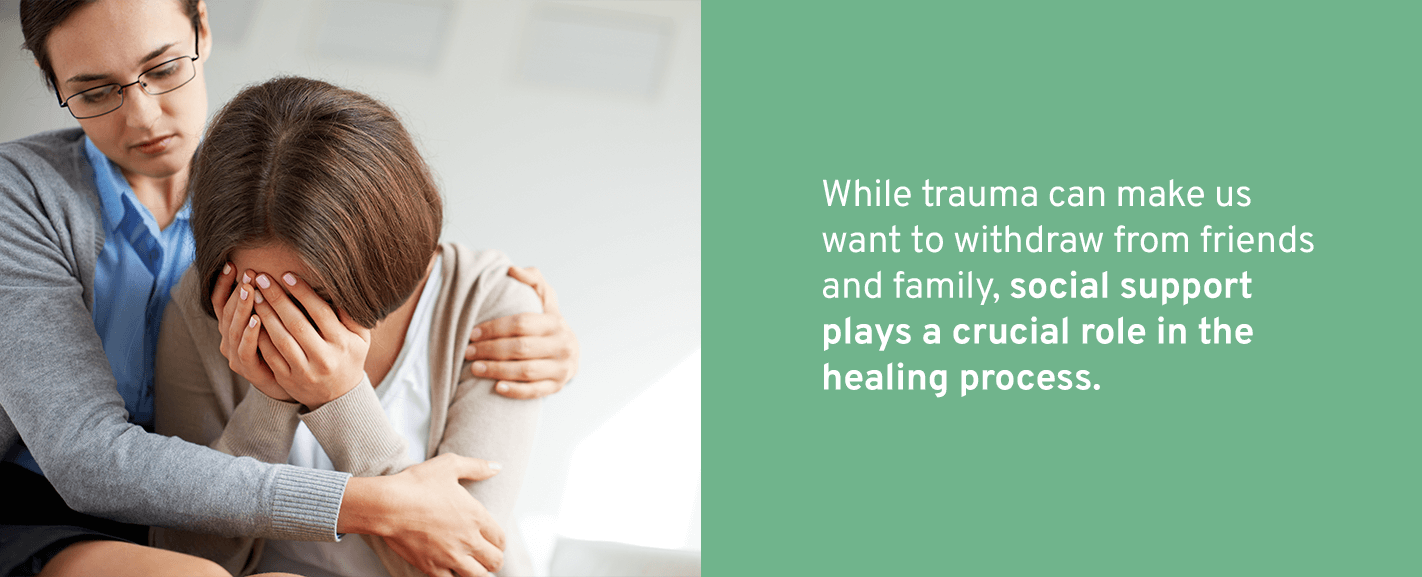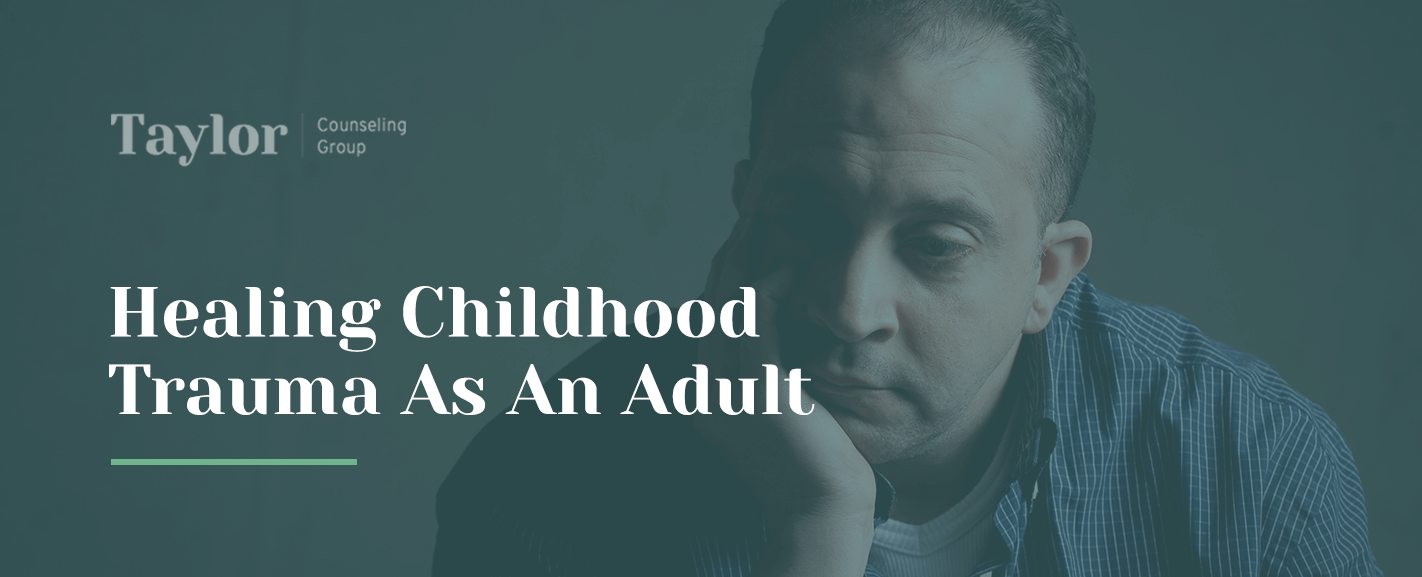We often underestimate how childhood experiences affect us as adults. Many people might associate childhood years with resilience and strength. However, trauma has a more substantial impact than you might realize. If left untreated, the emotions that come from traumatic events can carry into adulthood. We must learn how to identify, process and treat these difficult emotions in order to heal.
While coping with childhood trauma can be challenging, professionals can help guide you in the right direction. Healing childhood trauma as an adult can lead to significant improvements in your overall health and wellness.
- How to Recognize Signs of Trauma in Adults
- How to Heal From Childhood Trauma as an Adult
- Begin the Healing Process
How to Recognize Signs of Trauma in Adults
For adults, childhood trauma can manifest itself in several ways. For instance, if a person has trauma due to childhood neglect, they may feel undeserving of other people’s affection, which can lead to difficulties in forming solid and healthy relationships as an adult. Another example is how bullying and hurtful words about body image can lead to body dysmorphia in adulthood.
Signs of trauma in adults include:
- Chronic stress
- Impulsiveness
- Fatigue
- Difficulty establishing healthy relationships
- Eating disorders
- Substance use disorder (SUD)
- Anxiety and depression
- Little or no interest in activities you used to enjoy
- Decline in work or school performance
- Chronic health problems
- Difficulty concentrating
- Panic attacks
- Flashbacks or recurring dreams of the traumatic event
- Feelings of numbness or detachment
- Sleep issues
- Isolation
- Self-harm
- Suicidal thoughts
Severe trauma can even lead to post-traumatic stress disorder (PTSD), which can cause distressful symptoms like hypervigilance, flashbacks and emotional detachment when interacting with places, people or objects that remind you of the traumatic event. If you find that these emotions are long-lasting and interfering with your everyday life, it may be time to seek the help of a professional.
How to Heal From Childhood Trauma as an Adult
While it may seem challenging to heal from traumatic experiences in adulthood, the right approach can help you process your emotions and learn how to cope.
1. Recognize the Trauma
First, you must recognize your specific childhood experience as trauma. That way, you can come to terms with how the event has affected you and begin to accept it. Doing this can help validate your current difficulties, make sense of struggles and learn how to move forward.
2. Be Patient With Yourself
When it comes to coping with childhood trauma, it’s essential to be patient and kind to yourself. Shame and self-criticism are common symptoms of adults who have gone through traumatic childhood experiences. You might be hypercritical of your actions and judge how you handle your trauma, which can lead to hopelessness and anger. The key here is to recognize that you were not responsible for what happened to you in childhood. The experience has left a scar and you’re just trying your best to heal.
It would be best if you gave yourself the grace and patience to heal correctly and treat yourself as you would a best friend. Be kind to yourself and embrace the normal response you feel from your trauma. Only when you accept and love yourself for your emotions can you truly begin the process of healing.

3. Get Support From Loved Ones
While trauma can make us want to withdraw from friends and family, social support plays a crucial role in the healing process. Our friends and family can provide emotional support and understanding when we need it most. Attending trauma support groups or being around loved ones can make you feel heard, understood and validated.
Childhood trauma can especially make one feel alone and isolated. You might think that no one will understand what you’re going through. In reality, this couldn’t be further from the truth. When we let people in, they can become a great support system for healing.
4. Seek Professional Care
It’s crucial not to forget the importance of receiving professional mental health treatment. Trauma-informed therapy can help pinpoint triggers, develop healthy coping mechanisms and lessen the severity of your symptoms.
Types of therapy for childhood trauma include:
- Cognitive behavioral therapy (CBT): This approach focuses on determining the connection between our behaviors and our thoughts and feelings. When we struggle with trauma, our emotions regarding the event can cause us to develop dysfunctional behaviors. In adulthood, the behaviors can impact our relationships and ability to function in daily life. CBT aims to help you create healthier and more balanced thinking patterns when coping with childhood trauma.
- Psychodynamic therapy: Unlike CBT, psychodynamic therapy focuses on the unconscious mind. Psychodynamic therapy can help you understand the meaning of your trauma and how it might impact you and your relationships. You’ll work with a counselor to examine your childhood experiences and current relationships and understand how your existing coping mechanisms affect your life. Similar to CBT, psychodynamic therapy focuses on changing behaviors, just through different methods.
- Prolonged exposure therapy: This behavioral therapy can be very effective in treating people with PTSD, especially regarding addressing childhood trauma. A few therapeutic strategies can be used, though they generally involve gradually exposing yourself to memories of the traumatic event to reduce their negative impact and symptoms. While it may seem challenging, awakening PTSD symptoms in exposure therapy can help you approach the trauma in a healthier, safer way.
- Eye movement desensitization and reprocessing (EMDR): Another helpful therapy for trauma is EMDR, which focuses on reducing negative emotional responses to traumatic events. You’ll focus on the traumatic memory while working with bilateral stimulation like eye movement, tones, tactile taps and vibrations or buzzers. EMDR therapy creates a safe space for people to process their trauma. It can help reduce emotionally upsetting reactions to overcome PTSD.
- Cognitive processing therapy (CPT): CPT is a specific type of cognitive-behavioral therapy focused on understanding your trauma. Through psycho-education, you can gain awareness of the relationship between your thoughts and emotions. It can also help identify automatic thoughts you may have believed you had no control over. You’ll soon begin discovering unhelpful thought patterns that you can change to improve your mental health.
Begin the Healing Process
Childhood is a delicate period of life, and it’s essential not to underestimate its power over the present. Traumatic events can manifest in several ways, bringing distressful symptoms and even leading to PTSD. If left untreated, it can be challenging to process our emotions and move forward healthily.
At Taylor Counseling, we provide trauma-informed therapy to help you heal. With our highly trained and compassionate counselors, you can begin identifying unhealthy thought patterns and behaviors in a safe, supportive setting. Therapy can provide the tools you need to cope and overcome trauma. Over time, you may notice significant improvements in your overall quality of life.
To begin the healing process, schedule an appointment today.






